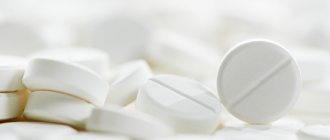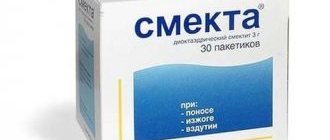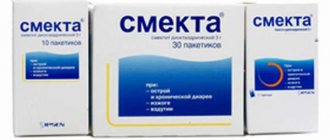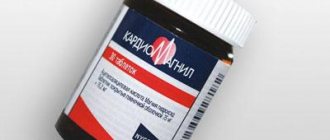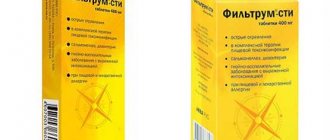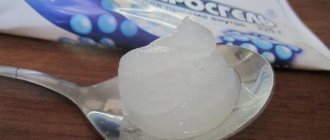In case of alcohol poisoning, the patient tries to use any available medications and folk methods to eliminate the symptoms of a hangover. The reasons for this condition are poisoning by toxins that are produced when ethanol (the main active ingredient of alcohol) interacts with liver enzymes. A by-product is formed - acetaldehyde, which is ten times more toxic than alcohol itself. Together with the blood, the toxin spreads throughout the body and poisons tissues and organs.
Smecta is a sorbent preparation. Thanks to its mild action and a small number of contraindications, it gently envelops the organs of the gastrointestinal tract and accelerates their elimination from the body naturally. Smecta will help you safely with a hangover: the active substance is a natural sorbent.
Compatibility of Smecta and alcohol
Treatment with any drug should not be accompanied by the consumption of alcohol. If violations occur, it is recommended to stop drinking alcohol and not drink water for 4 hours. Consequences can occur when using any form of release, even ointment.
You should not take the medicine with alcohol, but you can take alcohol before or after the medicine. It is recommended to wait for the time interval prescribed by doctors.
The course of treatment implies the absence of alcohol in the body for up to 1 month (may vary depending on the doctor’s testimony).
Alcohol and the drug are not compatible; taking them simultaneously can cause consequences. Therapy should not be accompanied by alcohol consumption. But the drug can be used to relieve the results of poisoning of the human body with acetaldehyde.
Take the Attention Test! Find 10 differences! (click right here!)
Absolutely forbidden
In case of severe poisoning, after taking smecta, you must wait for the ambulance to arrive. You can place the patient on their side and provide plenty of fluids. There are some prohibitions that you should know, namely:
- Do not place the victim on his back, otherwise he will choke on vomit.
- Drinking alcohol.
- Wash your face in a cold shower, as your body temperature is quite low.
- You can get up or walk, you can only lie down.
- Don't leave him alone.
- If you are unconscious, do not try to rinse your stomach or induce vomiting (at home). There is a high risk of developing airway failure.
In addition to alcohol intoxication and hangover syndrome, smecta has other important purposes. You can easily take it in cases of severe food poisoning, and if poisons and toxic substances have spread throughout the body. Its main advantage is that it does not spread in the blood, but remains in the intestines, where it actively collects all poisons and quickly removes them from the human body. It can be used even by children. The standard course of treatment is three to six days.
Description of the drug
The active ingredient of the drug is diosmectite. Release form: powder for preparing a suspension of grayish, white, light yellow hue. The smell is weak with a hint of vanilla.
Dextrose monohydrate, sodium saccharinate, and flavoring are used as excipients, depending on what is indicated on the package. The medicine is taken orally.
The drug acts as an aluminosilicate of natural origin. Designed to relieve the symptom of diarrhea, due to the property of adsorption, the substance is not absorbed by the body and is excreted in its pure form.
If taken in the indicated dosage, the drug does not affect the functioning of the intestines and does not give a color to the feces. Action: helps stabilize the gastrointestinal mucosa, improves mucus synthesis, increases cytoprotective properties.
Indications:
- Diarrhea of drug origin.
- Diarrhea of allergic origin.
- Diarrhea caused by poor diet and quality of food consumed.
- Heartburn.
- Recurrent dyspepsia.
- Diarrhea of infectious origin.
Prescribed for children and adults. It is not recommended for adults to take more than 6 sachets per day. For children under one year old - no more than 1 sachet per day. It is recommended to prepare a suspension in a baby bottle, distribute the dose into several servings, or add it to liquid and semi-liquid food.
Contraindications:
- intestinal obstruction;
- sucrose-isomaltase deficiency;
- individual intolerance to components;
- allergic reaction to fructose, glucose-galactose.
During pregnancy and lactation, consultation with a specialist is required. It can be taken strictly in the indicated dosages. In case of overdose, a side effect is bezoar and constipation. The drug is dispensed from the pharmacy without a doctor's prescription.
Hangover therapy
The medicine can be taken to eliminate the following hangover symptoms:
- migraine;
- general weakness;
- nausea, vomiting;
- tremor;
- joint pain.
To do this, you need to take the medication both before and after drinking alcohol. It is recommended to dissolve 1-2 sachets of the substance in a glass of clean water and drink before bed. The result will be more effective if you prevent a hangover. To do this, you need to drink the drug before drinking alcohol.
It is recommended to cleanse the intestines by defecation two hours after taking the sorbent. It will be possible to avoid worsening hangover symptoms, since toxins will enter the body from the intestines, worsening the general condition. You should wait until you have the urge to defecate before going to bed, or wake up two hours after taking the drug.
The condition of a drunken person is alleviated by slowing down the metabolism of ethyl alcohol and speeding up the removal of acetaldehyde from the body.
Mechanism of action
A hangover, in which a person exhibits a complex of unpleasant symptoms, is alcohol poisoning. This causes dry mouth, nausea, and headache. This situation is very dangerous, since the symptoms indicate the breakdown of ethyl alcohol in the body. And a prolonged hangover may mean that some of the products of this decay have not left the body and continue to poison it. The negative impact is directed to the stomach, intestines and brain.
Will Smecta help with a hangover? The drug is able to prevent dangerous effects and remove all substances that were formed during the breakdown of alcohol. This is why a person’s well-being improves significantly and symptoms disappear. This is evidenced by the reviews of people who have tried this method.
Hangover
The main effect of Smecta for a hangover is considered to be the normalization of the mucous membranes of the gastrointestinal tract. And thus the internal organs are protected from the negative effects of toxic substances. That is, Smecta, when entering the body, absorbs poisons and promotes the formation of an additional barrier by the intestinal mucosa. Thus, the breakdown products of ethyl alcohol are removed from the body without having a negative effect on microelements and vitamins.
As for the stomach, the active substance, when it gets there, is able to envelop its walls, and this leads to a slowdown in the dissolution of toxins in the circulatory system.
Consequences of taking
A medicine combined with alcohol may not work as expected. The effectiveness of the drug is reduced because the substance is bound not only by allergens that cause the disease, but also by molecules of formaldehyde and alcohol. Therapy in this case can be considered ineffective.
The medicine may cause undesirable effects. Urticaria may develop, in severe cases - Quincke's edema, the side effect on the liver increases, and the development of ulcers is provoked.
A course of treatment combined with alcohol consumption causes migraines and lethargy. The weakened effect of the medicine cannot combat the negative effects of alcohol, which is why ulcers may appear on the stomach mucosa and bleeding may occur.
Is it allowed to take Smecta with alcohol-containing drinks?
The simultaneous consumption of alcoholic beverages and the drug Smecta is not permissible. Alcohol reduces the effectiveness of treatment. The medicine spends energy on binding not only toxins, allergens and other substances that provoke the disease, but also on capturing molecules of alcohol and formaldehyde. Therefore, interaction between the sorbent and alcohol should be excluded.
You should not take Smecta or drink alcohol , as undesirable manifestations may appear or intensify. The patient may experience a urticaria-type rash and Quincke's edema. You should not drink alcohol during the course of treatment. During therapy you need to avoid products containing alcohol. This will allow you to quickly cure the disease.
Alcohol after treatment
It is recommended to drink alcohol after taking the drug, since it will be possible to reduce the negative effect produced by alcohol. In this case, it is not necessary to wait a certain time interval, since the substance only adsorbs ethanol without entering into a negative chemical reaction with it.
Following the diet prescribed by your doctor will help speed up the treatment of diseases associated with the gastrointestinal tract.
It is recommended not to drink alcohol during therapy, as it reduces the effectiveness of the drug. The medicine can be used to relieve hangover symptoms, but should not be taken at the same time as alcohol.
Smecta and beer
Smecta is a sorbent that is taken to relieve symptoms of poisoning. It should not be taken together with alcohol because it can cause allergic reactions.
The intensity depends on the person’s condition, the dosage of the drug and the beer. The maximum manifestations of allergies are angioedema and anaphylactic shock. With such consequences, medical intervention is required.
It is recommended to take this drug to prevent hangover syndrome by taking one or two sachets of the drug two hours before starting to drink alcohol. You can also take it to speed up the process of eliminating toxins and stopping the symptoms of a hangover.
The benefits of taking Smecta for food or alcohol poisoning
Smecta is often prescribed by doctors for poisoning, since this drug belongs to a group of medications that can neutralize toxins and poisons in the human intestines, removing them naturally. This medicine is unique in its own way.
The powder is characterized by an adsorbing and enveloping effect, neutralizing various substances harmful to the body in the intestines. Let's take a closer look at how Smecta works, in what cases it is used, and how to take it correctly in case of ordinary or alcohol poisoning.
Organs affected by the toxin
The combined use of pharmacological agents and alcohol has a toxic effect on the internal organs and environments of the body. Alcohol, entering into a chemical reaction with a medicine, leads to poisoning, disrupts physiological processes, enhances or weakens the healing properties of drugs.
The liver suffers more than other organs. She gets hit twice. Many medications have a side effect - hepatotoxicity, destroy cells, and disrupt the physiology of the organ. In the liver, alcohol breaks down to ethanal, a substance 20-30 times more toxic than ethanol, which causes the death of hepatocytes.
Dangerous groups of drugs for the organ in combination with alcohol:
- anti-inflammatory;
- hormonal;
- antibacterial;
- antifungal;
- glucose control agents for diabetes mellitus;
- anti-tuberculosis;
- cytostatics (chemotherapy drugs);
- tranquilizers (anti-epileptic, psychotropic).
In second place among the internal organs exposed to the harmful effects of alcohol together with medications are the heart and vascular system. Strong drinks during drug therapy constrict blood vessels and increase blood pressure. The simultaneous intake of alcohol and chemical substances leads to failure of the myocardium and increases the risk of developing an attack of angina pectoris and a heart attack.
A mixture of ethanol and pharmaceuticals disrupts the quality of the blood and reduces clotting. This is dangerous due to internal bleeding and strokes.
How to use
To reduce the level of intoxication after drinking alcohol and prevent a hangover, you need to drink 2-3 sachets of the drug before the party . For prevention purposes, the medicine can be taken after a feast, for example, before bed.
Also, smecta after alcohol can help alleviate the symptoms of intoxication. To do this, after drinking alcohol, you should induce a gag reflex and dissolve a couple of packets of powder in water. If necessary, treatment is continued in the morning after waking up. The standard dose is indicated in the instructions for use. If vomiting reflexes appear 1.5 hours after taking the powder, it is necessary to repeat the therapy.
The powder is diluted in 0.5 cups of water. The prepared solution should be taken 3 times a day. In case of acute hangover, the dose can be increased to two or three sachets at a time. The drug acts from the first use, the therapeutic effect is achieved after 20-30 minutes, in case of severe poisoning - after 2-3 hours. The medicine must be taken for three days.
Approximately 2-4 hours after administration, it is necessary to empty the intestines with an enema. Otherwise, the likelihood of a reverse effect increases, as a result of which the body will become intoxicated.
The property of adsorbents is not only the absorption of toxic substances formed as a result of the breakdown of alcohol, but also the active components of medications. That is why it is prohibited to use smecta together with other hangover medications .
To speed up recovery and increase the effectiveness of therapy, simultaneously with taking the powder, you must adhere to a special diet, which involves reducing the load on the gastrointestinal system. To do this, the patient should take food in small doses with short intervals between meals, and also avoid feelings of hunger. A person who has had too much the night before needs to eat mucous foods: oatmeal, jelly, chicken broth, rice water. Such food helps restore mucous membranes. You should also drink plenty of fluids to avoid dehydration.
Smecta is an excellent inexpensive remedy, used in all cases of life, and should be in any home medicine cabinet. Numerous reviews from patients, including those suffering from hangover syndrome, indicate the effectiveness of the drug, which can relieve the symptoms of an acute hangover and eliminate intoxication syndrome.
Alcohol poisoning can lead to unpredictable consequences, especially if a large amount of drinking has been consumed and the hangover is accompanied by intense symptoms. In such cases, you need to contact a specialist. If the intoxication of the poisoned person does not threaten his health and life, treatment can be carried out independently, using sorbents, for example, smecta.
otravlenye.ru
Rules for taking medications and alcohol
Drinking alcohol during treatment minimizes the clinical effect of therapy and creates a risk of developing complications of the disease.
If this cannot be avoided, follow the rules of behavior that will reduce the occurrence of negative consequences:
- Do not drink strong drinks (vodka, cognac, whiskey), choose dry wine (100-150 ml), beer (no more than 300 ml). Don't drink alcohol on an empty stomach.
- The interval between taking the medicine and alcohol should be at least 2 hours.
- To reduce the toxic effect, take medications that protect the liver (hepatoprotectors), pancreas (pancreatin), and stomach (antacids ─ Rennie, Almagel).
If a person takes antiviral medications for colds, anti-inflammatory drugs, alcohol in moderation does not pose a threat to the body.
Alcoholic drinks during treatment are strictly contraindicated in cases of liver cirrhosis, severe infectious diseases, and during a course of chemotherapy.
Advantages and disadvantages
It is not for nothing that the drug is a leader among similar drugs. Its demand is associated with a number of positive qualities of the sorbent.
The advantages include:
- No negative reactions when using the medication. Only in extremely rare cases, with prolonged use, are minor allergic manifestations possible.
- Mild effect of the drug. It has no age-related contraindications. It can be used even by pregnant women and during lactation.
- Selectivity of the product. Smecta removes only harmful substances, preserving microelements and intestinal microflora that are beneficial to the body.
- It has a powerful therapeutic and adsorbing effect. Unlike similar drugs, smecta also restores the body.
Another significant advantage of the medicine is the ability to use it immediately after drinking alcohol. Due to its compatibility with alcohol, it will help stop intoxication.
The disadvantages include the inconvenience of preparing the suspension. In order to obtain a suspension, it is necessary to methodically mix the solution while adding the powder. Otherwise, the substance will clump and be inconvenient to take.
Disadvantages can also include the effect of smecta on other medications. The sorbent reduces their effectiveness, so it is recommended to stop taking other medications for a while.
When used with other medications, it is necessary to maintain at least a two-hour interval between taking them.
If you ignore the recommended dosage and take more than prescribed, problems with the motility of the digestive system may occur. It is worth remembering that with prolonged use of smecta, the intestinal microflora suffers. As a result, dysbiosis (imbalance of intestinal microorganisms) as well as anemia (decreased hemoglobin level in the blood) may develop.
All these negative qualities can be called conditional. Knowing about the effect of smecta in alcohol poisoning and following the recommendations described in the instructions, you can easily avoid negative consequences.
Medicines, alcohol and chronic diseases
If a person has chronic diseases, simultaneous use of alcohol and medications is potentially dangerous for the functioning of vital organs. Since patients systematically take prescribed medications, the influence of alcohol can lead to negative consequences.
People with chronic heart disease (angina pectoris, heart defects) develop arrhythmias of varying severity. Heart attacks with severe pain syndrome develop, which is not relieved by Nitroglycerin, and the risk of developing myocardial infarction increases significantly.
In case of chronic liver diseases (viral hepatitis, hepatosis), alcohol during treatment can become a trigger in the development of cirrhosis and hepatocellular carcinoma (cancer).
Drinking alcohol during cirrhosis leads to the following consequences:
- bleeding into the abdominal cavity;
- liver decomposition, infection, peritonitis;
- hepatic coma;
- death.
If a person is on long-term treatment with sedatives, psychotropic drugs, tranquilizers, he is contraindicated in drinking alcohol. This leads to severe depression and the appearance of obsessive states (hallucinations, phobias). Suicidal feelings develop. Such a patient needs constant monitoring and assistance from a psychiatrist.
Contraindications
The drug has a fairly small list of restrictions.
It is not recommended to take the medication during a hangover and alcohol intoxication in the following cases:
- with intestinal obstruction;
- if a person is intolerant to the components of the drug;
- with regular constipation.
Before use, you must carefully read the contents of the instructions. Only competent use of the product gives good results in the treatment of hangover and intoxication.
The most dangerous combinations and consequences
The combination of alcohol and chemical-based drugs can lead to serious disorders in the body, and in some cases to fatal consequences.
List of medications and their side effects in combination with alcohol:
| Name of group, drug | Negative results of interaction |
| Neuroleptics (tranquilizers, anticonvulsants, hypnotics) | Severe intoxication, up to cerebral coma |
| CNS stimulants (Theophedrine, Ephedrine, Caffeine) | Rapid increase in blood pressure, hypertensive crisis |
| Antihypertensives (Captofrin, Enalapril, Enap-N), diuretics (Indapamide, Furosemide) | Sudden drop in pressure, collapse |
| Analgesics, anti-inflammatory | Increased toxic substances in the blood, general poisoning of the body |
| Acetylsalicylic acid (Aspirin) | Acute gastritis, perforation of gastric ulcer and 12-PC |
| Paracetamol | Toxic liver damage |
| Hypoglycemic (Glibenclamide, Glipizide, Metformin, Phenformin), insulin | A sharp decrease in blood sugar levels, hypoglycemic coma |
How to take Smecta for alcohol poisoning?
To prevent rapid intoxication, it is recommended to drink 2 packets of the drug before drinking alcohol. The contents of 1 package are dissolved in 100 ml of still water. To prevent the powder from forming lumps, pour it slowly into a glass, constantly stirring the liquid. If the feast is delayed, you need to increase the dose by drinking 1 more packet of Smecta, but not earlier than after 1-1.5 hours. The daily intake for an adult should not exceed 6 sachets of powder.
An aqueous solution of the drug can be drunk during meals. If the dose of alcohol entering the body is small, then 1 serving is sufficient.
In case of severe alcohol poisoning, it is recommended to induce vomiting. Such actions are necessary in order to free the stomach contents from excess amounts of alcohol and prevent further absorption of ethanol breakdown products. After vomiting, you should take 2 sachets of Smecta. No later than 3 hours later, it is necessary to cleanse the intestines. You can give an enema. Cleansing the intestines will prevent the reabsorption of toxic substances into the body, which will begin to be released after the cessation of the sorbent.
If a person's condition does not improve, they should consult a doctor. The possibility of severe alcohol poisoning cannot be ruled out, which can cause death if qualified medical assistance is not provided in a timely manner.

